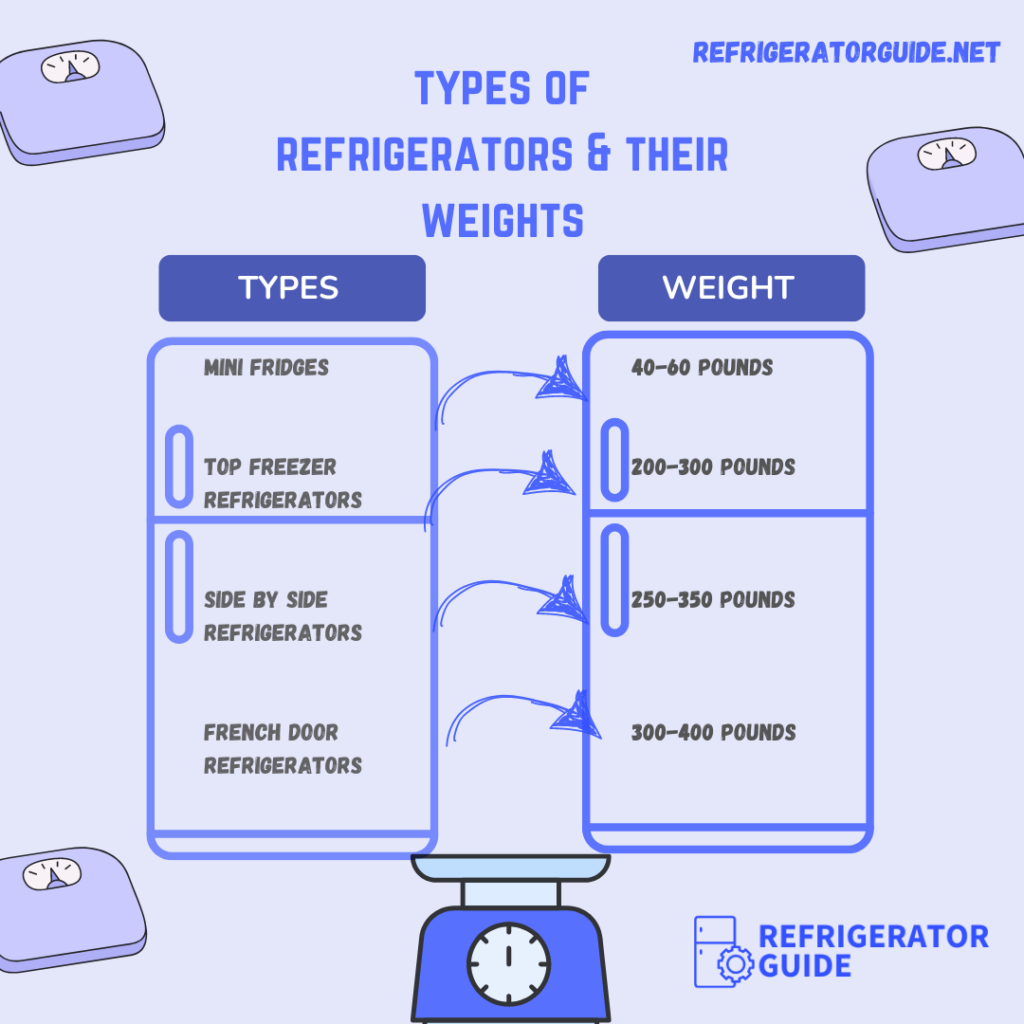Table of Contents
Thinking of buying a new refrigerator? BUT wait! Did you get an idea of your refrigerator weight? It’s critical to comprehend a refrigerator’s weight before relocating or buying one. Refrigerators vary widely in size and design, which causes a wide range in weight. Smaller refrigerators, such as side-by-side or French door types, are lightweight and easy to handle, but more giant refrigerators can be substantial. When making transportation plans, knowing the appliance’s weight lets you ensure you have the necessary tools and assistance for a secure relocation. Selecting the ideal refrigerator for your needs and space is easier when you know these weight errors. Hence, let’s talk about the heavy-weight stuff first!
Insights into the Average Weight of Refrigerator
Quality; check, cooling; check but have you ever considered the weight of fridge? Refrigerators are available in various sizes and types, with different weight capacities.
- Typical Range: Most refrigerators are found in the 200–300-pound range.
- Mini Fridges: Small refrigerators often weigh forty to sixty pounds.
- Larger Models: French door and side-by-side refrigerators have a maximum weight of 400 pounds.
- Factors: Size, kind, and building materials all affect weight.
Let us go into some more details the fridge weights according to their types.

Types of Refrigerators and Their Weight
Here’s a look at some of the types of refrigerators and their weight.
Mini Fridges
- Weight: Between forty and sixty pounds
- Perfect for cramped areas like offices or dorms
Top Freezer Refrigerators
- Weight: 200 to 300 pounds in weight
- Heavier and equipped with additional functions like dispensers or ice makers. Side-by-side refrigerators.
Side-by-Side Refrigerators
- Weight: 250 to 350 pounds in weight
- Vertical freezer sections and narrow doors
French Door Refrigerators
- Weight: 300 to 400 pounds in weight
- Bigger and designed like a bottom freezer

Factors Affecting the Weight of a Fridge
Several factors influence the weight of a refrigerator; Here’s a look at some of them.
- Size: Larger refrigerators with more excellent cubic feet of storage will weigh more.
- Features: Ice makers, water dispensers, and refrigerators with cutting-edge cooling systems typically weigh more.
- Construction Materials: The weight of a refrigerator may increase depending on the materials used in its construction, such as stainless steel.
Tips to Reduce Weight
A refrigerator is heavy, (might credit it to some of the parts of the fridge) so moving one might be difficult. To help in the process, consider the following advice;
- Eliminate Bulky Items: To lighten the load, remove all food, shelves, and drawers.
- Secure Doors: To keep them from swinging open during the transfer, tape them shut.
- Dolly: Employing a dolly will facilitate the refrigerator’s transportation by distributing the weight more evenly.
Final Thoughts
To sum up, understanding a refrigerator’s weight is crucial for purchasing and relocating. Small refrigerators weigh 40 pounds, whereas more enormous French doors weigh 400 pounds. Each refrigerator style has a different weight; smaller and top freezer versions are often lighter than side-by-side or French door refrigerators with additional functions like ice makers. Select lighter refrigerators or remove heavy items before relocating to manage weight.
In conclusion, whether you’re buying or moving a refrigerator, knowing how much a fridge weighs makes preparation easier and guarantees a more seamless experience.
Weight up the cooling!

